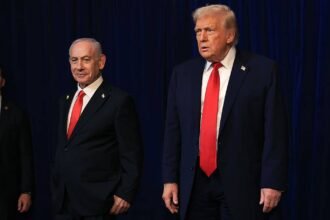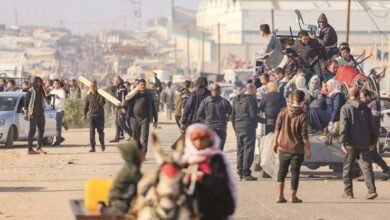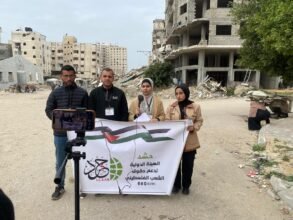
ICSPR: The U.S. Proposal Regarding an “International Stabilization Force” Requires Fundamental Revision to Ensure Its Alignment with International Law and the Rights of the Palestinian People
Thursday, 6 November 2025
Press Release
ICSPR: The U.S. Proposal Regarding an “International Stabilization Force” Requires Fundamental Revision to Ensure Its Alignment with International Law and the Rights of the Palestinian People
The International Commission to Support Palestinian Rights (ICSPR) expresses its deep concern regarding what was announced by the U.S. Mission to the United Nations, and what was reported by diplomatic and media sources, concerning the submission of an official draft resolution by the United States to the UN Security Council in support of the so-called “Donald Trump Peace Plan for the Gaza Strip”, which includes the establishment of a “Gaza Peace Council” and the authorization of an “International Stabilization Force (ISF)” until the end of 2027. This force would undertake wide-ranging security and administrative tasks, including disarming resistance factions, controlling borders in coordination with the Israeli occupation, training security forces, and managing aid and reconstruction through an international fund supervised by the World Bank.
ICSPR believes that the proposal, in its current form, includes provisions that reinforce the role of the Israeli occupation in both security and administrative fields, marginalize Palestinian national representation, and treat the Palestinian cause as a humanitarian and security file rather than a struggle for liberation and rights. This would turn Gaza into an entity under long-term international trusteeship and would reproduce the Trump Plan in a modified form that serves U.S. and Israeli interests and contradicts the principles of justice, international law, and UN resolutions — particularly those affirming the right of the Palestinian people to self-determination and ending the occupation.
ICSPR emphasizes that the fundamental difference between an internationally mandated “Protection Force” requested by Palestinians and the U.S.-proposed “Stabilization Force” lies in the legal mandate and reference. A protection force is established with an explicit UN mandate under Chapter VII of the UN Charter, works exclusively under UN supervision, and aims to protect civilians, ensure the entry of humanitarian aid, monitor ceasefire implementation, and hold the occupation accountable — within a framework of ending the occupation and enabling Palestinians to exercise their rights.
In contrast, the proposed ISF, as outlined in the U.S. draft resolution, seeks to bypass an independent UN framework and grants the occupation and the U.S. direct executive and security authorities, turning it into a tool to manage Gaza rather than protect it, and a mechanism to consolidate Israeli control rather than end it. Additionally, linking the mandate of the force to purposes aimed at forcibly restructuring the political scene and disarming resistance could lead to more bloodshed instead of addressing these issues within a comprehensive national political settlement that respects the rights of the Palestinian people. Moreover, conditioning reconstruction or the continuation of the truce as a tool of blackmail to undermine Palestinian rights, or to override the roles of UN agencies and international organizations, is legally unacceptable.
ICSPR warns that granting such wide powers to an “enforcement” international force may lead to reproducing the occupation under international cover in the name of “stability,” while maintaining Israeli control over crossings, aid, and security — weakening Palestinian national institutions, excluding the PLO and the Palestinian Authority from any meaningful decision-making role, and undermining prospects for establishing a unified Palestinian state. ICSPR also warns against turning international aid and support into a tool of pressure and political blackmail rather than a humanitarian instrument for resilience, recovery, and reconstruction. The absence of a clear legal reference, timeframe, and accountability mechanisms recalls failed international experiences in other conflict zones, where some “stabilization forces” became instruments of influence rather than protection.
ICSPR notes that the Palestinian, Arab, regional, and international engagement with this proposal reflects legitimate concern regarding the security and humanitarian vacuum in Gaza after the aggression and the fear of a renewed Israeli offensive. However, such concern must not become a justification for passing a proposal that does not align with international law or entrenches international trusteeship. Past experiences have shown that no genuine stability can be achieved without respect for international law, ending occupation, and ensuring accountability.
ICSPR believes that any approach aiming to achieve stability in Palestine cannot be viable without ending the occupation, holding perpetrators of genocide accountable, and respecting the UN framework guaranteeing the rights of the Palestinian people. ICSPR renews its call to the Palestinian leadership and national forces to develop a unified stance regarding these developments, to agree on a vision for the transitional phase, and to activate diplomatic and legal efforts to protect the rights of the Palestinian people, safeguard unity of decision-making, and rebuild and activate Palestinian political institutions on democratic foundations.
ICSPR, based on the above, calls on the UN Security Council, the UN Secretary-General, and Member States to work towards fundamentally revising the U.S. proposal to ensure its full compliance with international law and relevant UN resolutions, to guarantee the following:
-
Any mandate for an international force must be a clear UN mandate under Chapter VII aimed at protecting civilians, monitoring the ceasefire, ensuring the entry of aid, and expediting reconstruction — not managing Gaza or imposing political trusteeship — while holding Israel fully legally responsible for the destruction and crimes committed, and obligating it to comply with its obligations under international humanitarian law, without granting it any supervisory or security role in Gaza.
-
Separating the humanitarian, relief, and reconstruction tracks from security and political conditionality, ensuring that aid and reconstruction are not used as tools of pressure or blackmail, affirming full Palestinian participation in any civil or administrative arrangements, and prioritizing a comprehensive ceasefire, lifting the blockade, ensuring Israeli withdrawal, and restoring normal civil life.
-
Affirming that any international presence must be within the framework of providing temporary protection to Palestinians and ensuring justice within a context leading to ending the occupation, with the aim of enabling the Palestinian people to exercise their inalienable rights — foremost among them the right to self-determination and the establishment of their independent state with Jerusalem as its capital.





